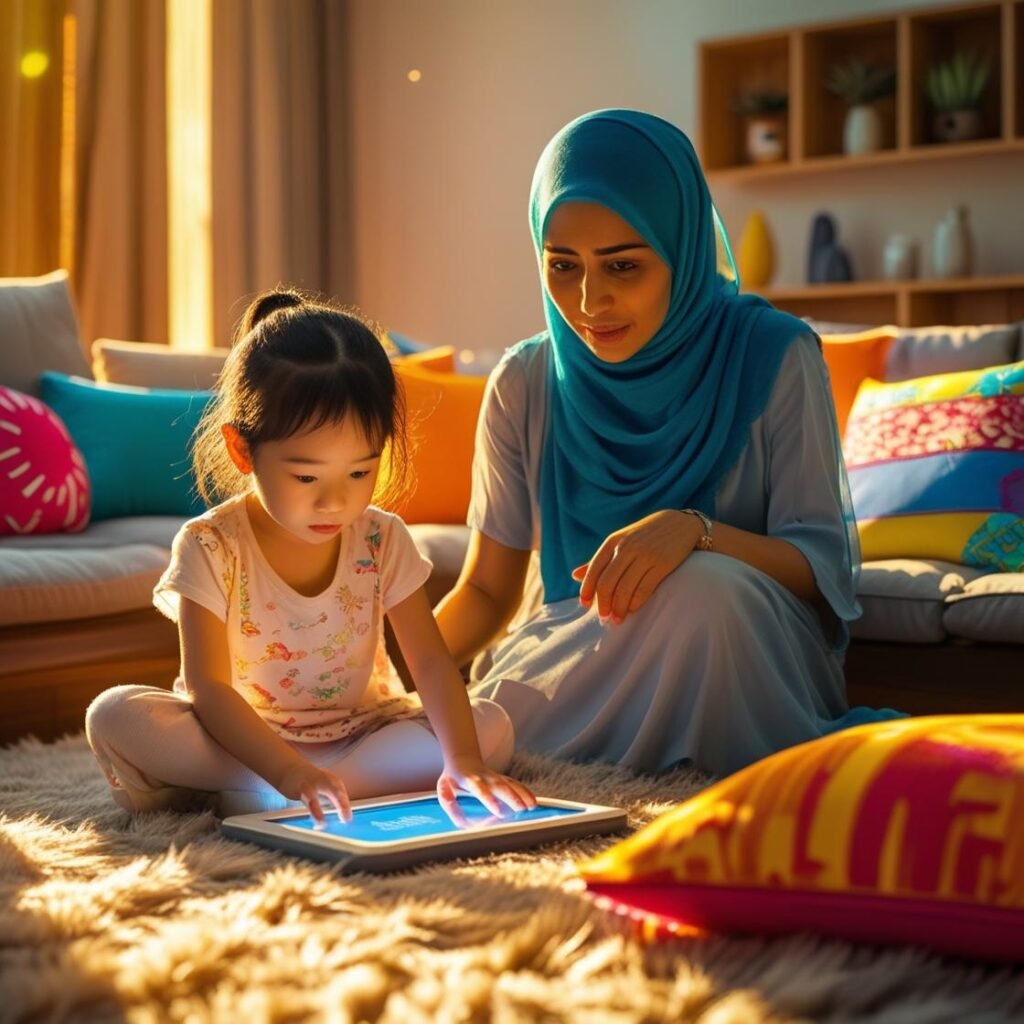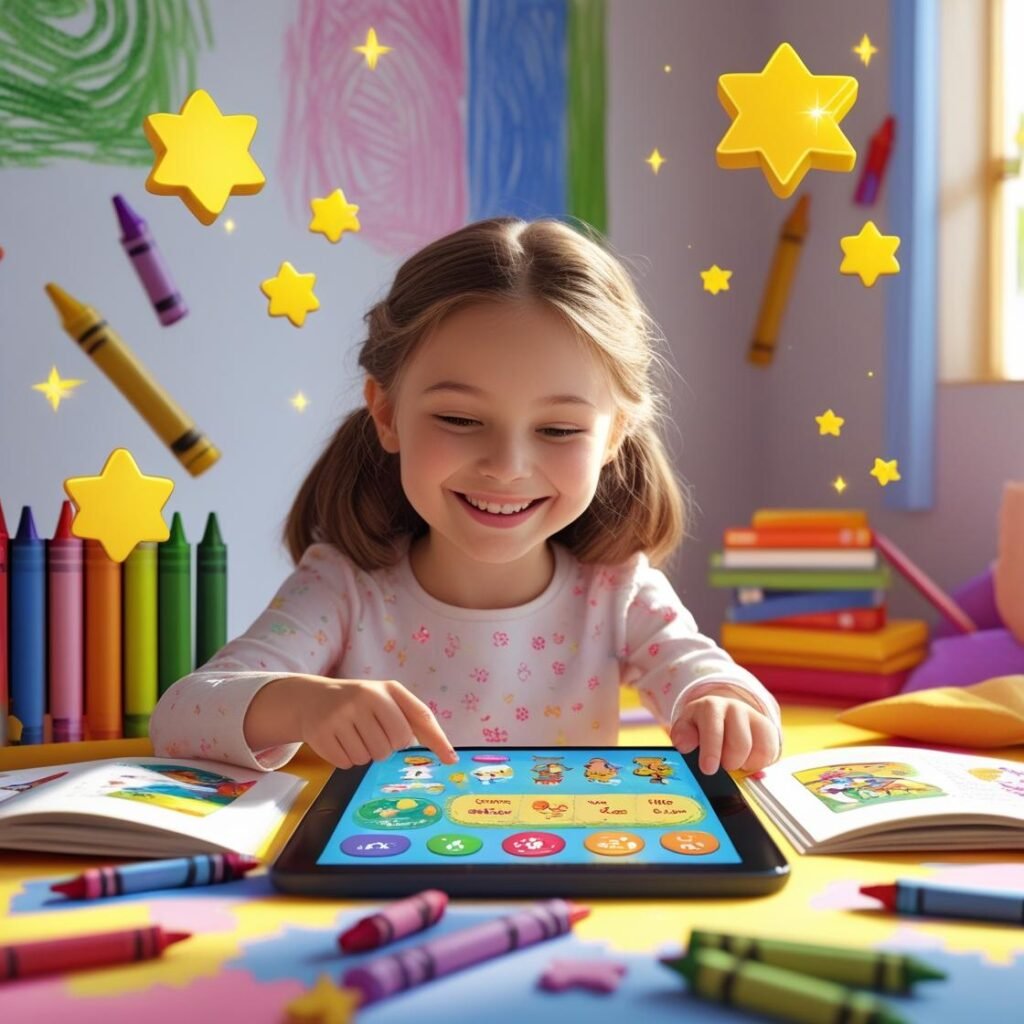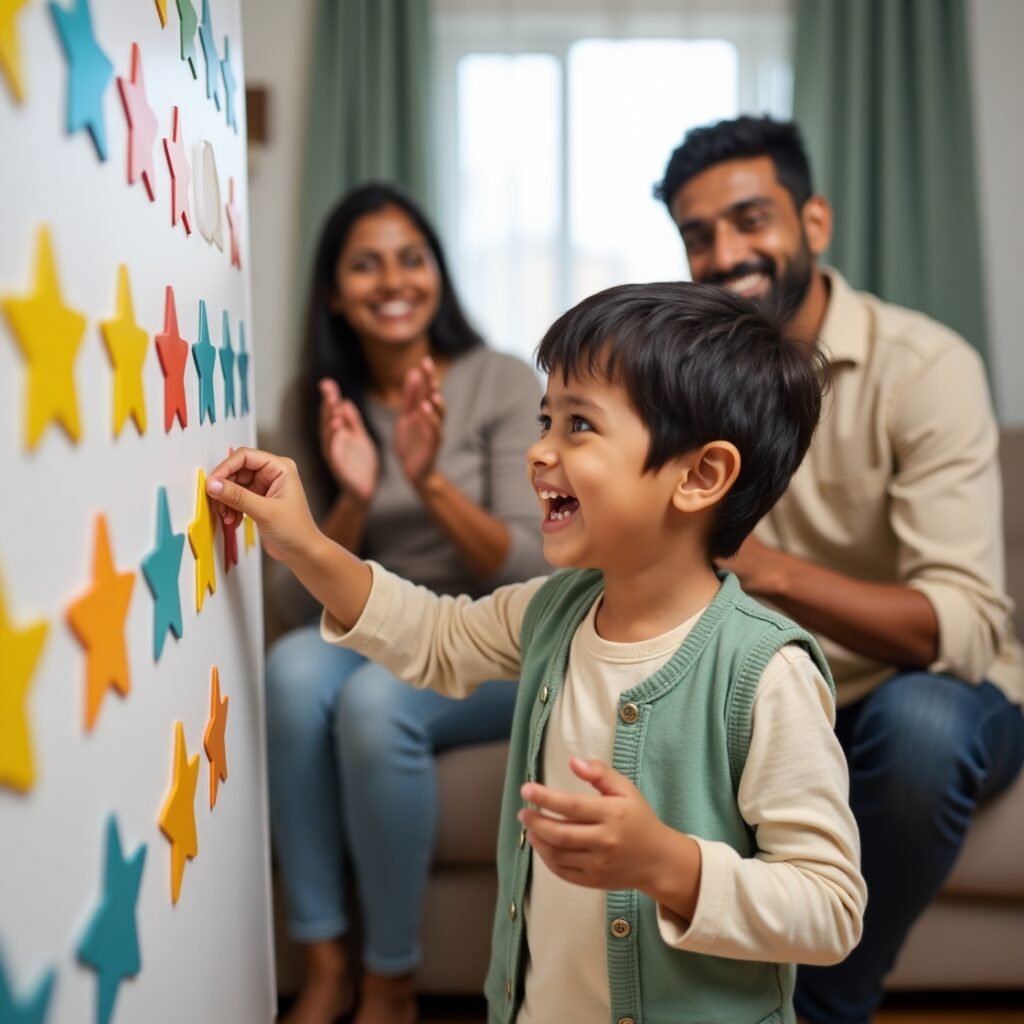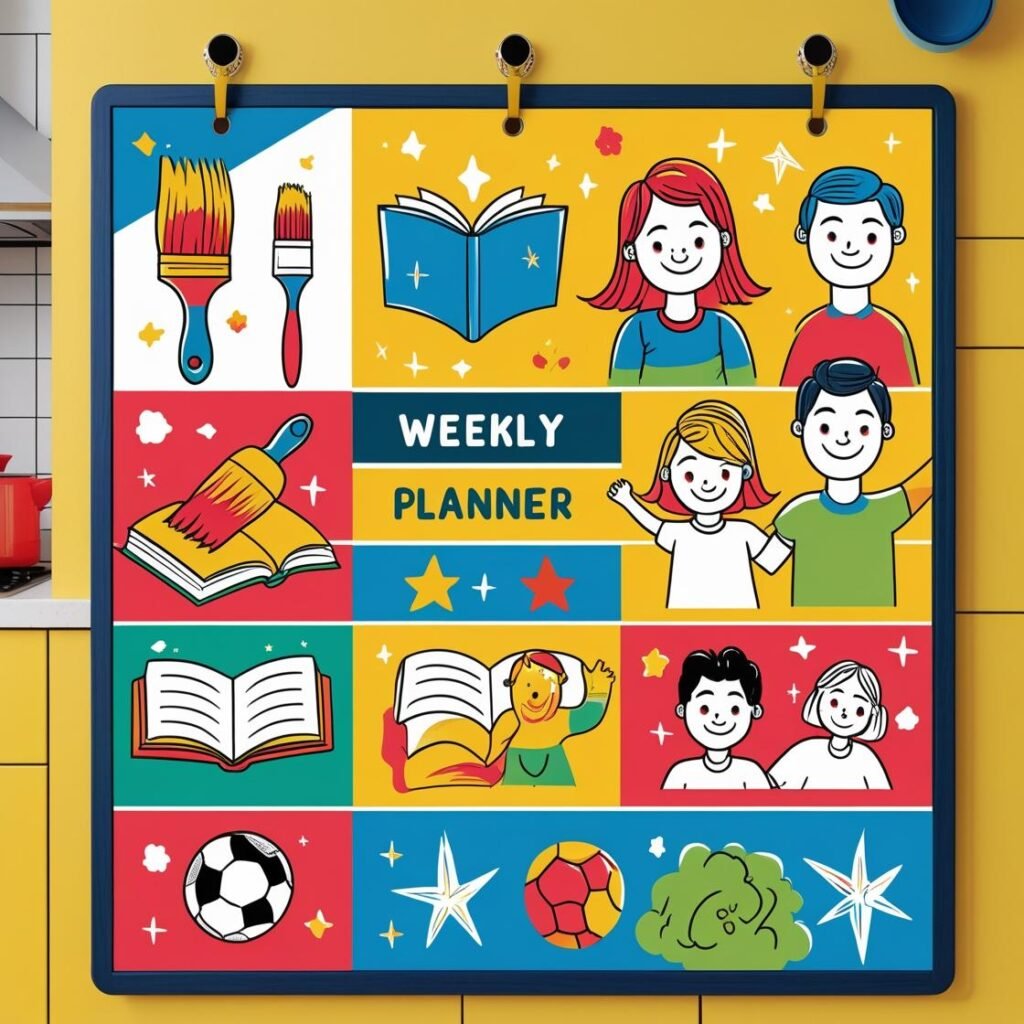Table of Contents
Screen time brain development is crucial for kids. Discover how Focus Fun replaces harmful screen habits with healthy, interactive learning.
👩👧 The Wake-Up Call: When Devices Replace Real Childhood
Rita sat on the edge of the bed, watching her 7-year-old daughter stare blankly at a tablet screen. What was once bedtime reading and cuddles had turned into bright lights and endless swiping. Her daughter barely noticed her sitting there.
“Mom, just one more level!” her daughter begged, eyes wide and flickering with exhaustion.

Rita felt a pang in her chest. It wasn’t about being strict—it was about seeing her daughter change. The smiles were less frequent. Sleep became disrupted. Conversations were replaced with YouTube videos. This was no longer just screen time; it was stealing childhood.
Like thousands of parents, Rita had underestimated the effects of screens on her child’s mind. What she would soon learn was that screen time brain development was more serious than she had imagined. And she wasn’t alone.
🧠 What Excessive Screen Time Does to a Child’s Developing Brain
Children’s brains grow fastest during the early years. From birth to about age 10, the brain forms over a million new neural connections every second. These connections thrive on exploration, movement, creativity, and human interaction. But what happens when screens replace these essential experiences?
The growing concern around screen time brain development is backed by powerful research. Overexposure to screens—especially unstructured digital content—can reshape a child’s brain, leading to lasting effects on emotional and cognitive development.
🔬 Scientifically Backed Risks of Too Much Screen Time:

- 🧩 Reduced attention span and inability to focus
- 🌙 Poor sleep quality due to blue light exposure
- 😟 Increased anxiety and mood swings
- 🗣️ Delayed language and communication skills
- 🧍♀️ Decreased physical activity, causing weight issues
- 👎 Weakened memory and academic performance
Studies show that children who engage in more than 2 hours of recreational screen time daily score lower in tests related to thinking and language. Even toddlers are not immune—early exposure affects impulse control, social behavior, and empathy.
The brain’s gray matter—responsible for processing information, emotions, and self-control—can shrink with prolonged screen use. These facts aren’t just alarming; they’re a call to action for every parent.
💡 Introducing Focus Fun: The Smart Fix for Screen Time Balance
So, what’s the solution? Should parents ban screens altogether? Not at all. The digital world is here to stay. The smarter approach is guided, meaningful screen time—and that’s exactly what Focus Fun provides.
Focus Fun is more than an app. It’s a complete screen time balance tool designed by child psychologists, educators, and digital wellness experts. It doesn’t just track time—it transforms screen time into a journey of self-regulation and discovery.
🎯 How Focus Fun Supports Screen Time Brain Development:

- Time Limits Without Tantrums
⏳ Kids are guided to gradually reduce screen usage with built-in timers and soft reminders. - Brain-Boosting Challenges
🧠 Offline activities like puzzles, physical games, and art tasks are encouraged daily. - Gamified Rewards
🎁 Completing real-world tasks earns rewards within the app—keeping kids engaged positively. - Customized Routines by Age
📚 Programs for ages 3–5, 6–9, and 10–12 ensure developmentally-appropriate engagement. - Bedtime Mode
🌙 Soothing audio stories replace screens before sleep, improving rest and relaxation. - Family Engagement
👨👩👧👦 Parents can track progress, create challenges, and participate in digital detox missions.
This approach gives kids a sense of control, turning digital devices from passive distractions into tools for learning and growth. Instead of addictive loops, they’re rewarded for creativity, movement, and mindfulness—exactly what the developing brain needs.
❤️ Real Stories: How Focus Fun Changed Families
Nothing is more convincing than the words of parents who’ve experienced real change. Here are three heartwarming testimonials from parents using Focus Fun:
💬 Priya, Mom of 8-year-old twins

“We were losing our evenings to screen fights. Now, my kids help set the table just to earn offline stars! They’re even excited about drawing again.”
💬 Ramesh, Father of a 10-year-old
“I used to feel helpless. Screens had replaced our conversations. Focus Fun helped us build new rituals—family reading night is now a favorite!”
💬 Sunita, Teacher and Parent
“I saw my students lose focus in class due to excessive screen time. I recommended Focus Fun to parents, and the results were incredible—kids came back more attentive and joyful.”
These stories prove that when screen time is restructured with intention, kids don’t resist—they thrive. The journey back to balance is not just possible—it can even be fun.
✅ Step-by-Step Plan for Healthier Screen Time Brain Development
Ready to make a change in your child’s screen habits? Here’s a step-by-step plan to use Focus Fun effectively:
🌈 7-Day Digital Balance Challenge:

Day 1: Install Focus Fun and set your child’s screen limit. Start with 2 hours or less.
Day 2: Introduce offline activities from the app—start with one puzzle or art task.
Day 3: Add a family mission—like “Help cook dinner” or “Read together for 15 minutes.”
Day 4: Try bedtime mode and track sleep quality.
Day 5: Let your child choose their reward. Celebrate wins, even small ones.
Day 6: Encourage screen-free play outdoors or with toys.
Day 7: Reflect. Talk about what felt good and what could be improved.
This simple plan helps rewire habits, promotes emotional bonding, and supports long-term screen time brain development.
It’s Time to Reclaim Childhood Joy
Children today live in a world surrounded by screens. We can’t change that—but we can change how they engage with them. The goal isn’t to eliminate technology. It’s to create healthy boundaries that nurture your child’s body, mind, and spirit.

Screen time brain development is too important to leave to chance. With tools like Focus Fun, you’re not just reducing screen time—you’re enhancing real-life experiences, strengthening family bonds, and building a foundation for emotional intelligence and academic success.
So don’t wait for another bedtime battle or another lost weekend. Take action now. Download Focus Fun, start the 7-day challenge, and see your child rediscover the joy of balance. 📱🎨📚
Because childhood should be about more than screens.
It should be about wonder, connection, and play.
FAQs
1. What is screen time brain development in children?
Screen time brain development refers to how a child’s brain is affected by the amount and type of digital screen exposure they receive. Excessive screen time can slow down cognitive, emotional, and social growth during critical developmental years.
2. How much screen time is healthy for kids to support brain development?
For healthy screen time brain development, experts recommend:
Under 2 years: No screen time (except video calls)
2–5 years: Max 1 hour/day (high-quality content)
6+ years: Max 2 hours/day (excluding schoolwork)
Keeping screen use balanced protects mental and emotional development.
3. What are the effects of too much screen time on brain development?
Excessive screen time can negatively impact brain development by causing:
🧠 Reduced attention span
😴 Poor sleep quality
😔 Emotional issues like anxiety or irritability
📉 Lower academic performance
🗣️ Delayed speech and communication skills
These effects are especially harmful in children under 10.
4. Can screen time cause developmental delays in toddlers?
Yes. Studies show that toddlers exposed to more than 2 hours of daily screen time are more likely to experience delayed speech, reduced social interaction, and emotional challenges, all of which impact early brain development.
5. Is educational screen time still harmful to brain development?
Not all screen time is equal. While educational content is better than passive videos, long periods of screen use—even for learning—can still overstimulate the brain. Balance is key for supporting screen time brain development.
6. How can I improve my child’s screen time habits for better brain growth?
Start with these steps:
Set daily screen limits
Use tools like Focus Fun to replace mindless screen time with offline tasks
Create screen-free zones (like bedrooms or dinner tables)
Encourage outdoor play and creative activities
This approach supports healthy brain development while keeping screen use in check
7. Does screen time affect a child’s sleep and mental health?
Yes. Excessive screen exposure, especially at night, disrupts sleep and increases stress and anxiety levels. A well-rested child shows better memory, focus, and emotional control—crucial for screen time brain development.
8. How does Focus Fun help balance screen time and brain development?
Focus Fun is a smart app that:
Sets healthy screen limits
Offers fun offline challenges
Rewards real-world learning
Supports parent-child interaction
It turns screen time into a tool for growth, not distraction—perfect for promoting screen time brain development.
9. Why choose Focus Fun for screen time brain development?
Focus Fun is designed to transform passive screen habits into interactive, brain-boosting activities—making it the ideal tool for supporting healthy screen time brain development in kids.
10. What’s the best way to start improving screen time brain development today?
Start small:
Limit screen time to 2 hours or less
Introduce daily non-screen activities (reading, games, chores)
Use Focus Fun to track and improve habits
Consistent, mindful steps lead to long-term improvement in screen time brain development

Pingback: Focus Fun: A Powerful Teacher Digital Intervention